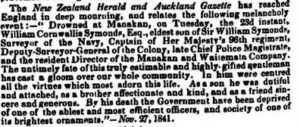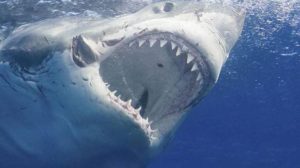1841: William Symonds vs. Shark
January 11, 2021
By AHNZ
On 23 November, 1841, an army Captain, The Deputy-Surveyor-General of New Zealand, the Chief Police Magistrate of Auckland, and a Member of New Zealand’s ruling Legislative Council all fell out of a boat in Manukau Harbour on one historic day in New Zealand history¹.
Five men fell into the water. Four of them were killed. One made it out alive. It changed New Zealand history forever and you never hear a thing about it!
“And I’m lost at sea and I’m an amputee
And there was slaughter in the water when I fought her
Shark attack!”- Split Enz (1980)
New Zealand and the Shark
 Thanks to Labour 5.0, the man-eating Great White Pointer is a protected species in New Zealand. Fish come first, human life comes second. It’s not legal to fight off a shark unless it’s during an attack that it has already initiated.
Thanks to Labour 5.0, the man-eating Great White Pointer is a protected species in New Zealand. Fish come first, human life comes second. It’s not legal to fight off a shark unless it’s during an attack that it has already initiated.
New Zealand has suffered 14 fatal shark attacks and 50 or more non-fatal attacks. In January 2021 Kaelah Marlow was killed by a great white shark at Waihi Beach. Previous to this, Adam Strange was killed at Muriwai Beach the same way in 2017.
“On 1 April 2007 New Zealand followed a number of other countries, including the USA, Australia and South Africa, and protected this species under the Fisheries Act 1996 and the Wildlife Act 1953.”
“It is illegal to take or harm great white sharks in New Zealand waters (out to 200 nm). It is also illegal for any NZ-flagged vessel to take great white sharks on the high seas.”
“Offenders face fines up to $250,000 and six months
imprisonment.”- Department of Conservation
Records show more than 60 ‘rough bumps’ on people that did not lead to violence. You’d have to be a pretty big fan of Helen Clark’s regulations not to throw the first punch in such circumstances!
Sharks of the Manukau
Not counting the 2013 shark fatality of Adam Strange at Muriwai Beach there have been 4 other shark kills along that coast, or, more specifically, by killer sharks that had predated within Manukau Harbour.
- 1966: A 50yo unnamed man killed while fishing; I assume he capsized like so many others.
- 1911 and late 1800s: According to DOC Marine Scientist Clinton Duffy both of these were cases of men whose boats capsized. Both of them received split ends wounds, became amputees, and died of blood loss.
- 1892: Henry Jacobson (lighthouse keeper at Manukau Heads) had his boat capsize on the way to work. Fought for his life and did not die.
Finally, (and this is the one not recorded in Statist history books) there is the death by shark of Deputy Surveyor-General of New Zealand, Chief Magistrate of Auckland, and member of New Zealand’s ruling Legislative Council, Captain William Symonds.
William Symonds vs. Shark
- 1840: Symonds boat capsizes in high wind and sea whereupon he swims for shore. For over an hour he fought, unable to be rescued by the many onlookers, and nearly made the beach. But at the last he was attacked by a shark that drew him down to the briney deep!
 He is remembered today by Symonds Street and Symonds Street Cemetery. An attempt was made to re-name Manukau Harbour to Symonds Harbour in remembrance of Governor Hobson’s dear friend and best man but it didn’t stick.
He is remembered today by Symonds Street and Symonds Street Cemetery. An attempt was made to re-name Manukau Harbour to Symonds Harbour in remembrance of Governor Hobson’s dear friend and best man but it didn’t stick.
It may be that Mr Adam, a Scottish Settler, was a 5th shark fatality in the same incident. Two other men drowned at the same time and only a single man, a Maori, made it to shore alive³. The Maori survivor “..had a knife with which he cut off his clothes & which he endeavoured to give to Capt Symonds.”; (Ref. Ensign Best’s journal.)
“the boat was upset; he was a powerful swimmer, but before he reached the shore a shark drew him down”- Ref. Dieffenbach (1843)
State history records that Symonds was not killed by a shark at all but by a “boating accident.” Governor Hobson was, perhaps conveniently, absent from Auckland at the time so his, the official version of the story, is not a first hand account. Nor is the above quote of Ernest Dieffenbach who had been exiled from his beloved study of New Zealand by Hobson.
Who to believe?
I side with Dieffenbach, Symond’s dear friend. He must have been informed by sources other than the official ones about the death-by-shark. Hobson’s regime would have loved to retain Dieffenbach for his scientific skills in their fledgling Colonial Government (aka Hobson Gang.) It doesn’t quite make sense that Ernest was sent away except that he was, like Symonds, unwilling to ‘go along to get along’.
The month prior to his death, Symonds asked permission to colonise at Manukau from Hobson. He was setting up what would be a powerful new settlement (Cornwallis) and I don’t think Hobson’s upper management were willing to allow it. I also think they had reason to be jealous of Symonds for his popularity with the colonists and the Maoris. Hobson’s top goons had become what contemporaries described as “lick-spittles,” especially Willoughby Shortland. Symonds had become a great political problem.
Symond’s body was never found; He has no grave in any cemetery. It was as if he had been ‘wacked’ by the Mafia.
“The idea was to establish a milling town and to that end the first and only colonist ship, The Brilliant, lurched its way from Scotland to Manukau Harbour…. landed on 29 October 1841.”
“Were the colonists met by a prepared township? No; It was a beach and bush wilderness. Symonds may have done his bit to sort things out had he not “drowned” in the act four weeks later…”- 1841: Cornwallis
And, then, the problem was solved. Like Harold Holt, the Australian Prime Minister who vanished while swimming at Melbourne’s harbour in 1967, Symonds was simply erased from the political scene. I would like to find more sources to resolve this colonial murder mystery but have read everything I can get my hands on already. It’s always possible that the shark was attracted to attack the men overboard as part of some political hit job. It sure would be good to learn more about the sole surviving Maori, the one who had a knife in the water and was witnessed ‘giving it’ to Captain Symonds by the “many” witnesses on shore.
—
Note: The New Zealand Herald and Auckland Gazette newspaper that is the source of many of the facts we have about the above incident didn’t last much longer. It had become inconvenient and critical of the Hobson Gang. This, Auckland’s first newspaper, was made shark food by Hobson in April 1841; Ref. 1841: New Zealand Herald and Auckland Gazette
1 Several of these roles belonged to just one person, Symonds
2 The fines for not letting a shark throw the first bite; Department of Conservation; whitesharkconservationtrust.org.nz
3 Ref. 8 December 1841, NZGWS; Papers Past
Image ref. John Bull, 16 May, 1842 (English newspaper) quoting what was “communicated” according to New Zealand Herald and Auckland Gazette on 27 November 1840
Ref. Killer sharks in Manukau harbour, Stuff (2009)
Ref. Travels in New Zealand, Ernest Dieffenbach (1843); enzb.auckland.ac.nz
2 thoughts on "1841: William Symonds vs. Shark"
Leave a Reply
 Like Comment Share
Like Comment Share







William Cornwallis Symonds is one of my heroes from the early days. If he had lived he would have been a prominent person in NZ history for sure.
He was just so gifted, everything came easy to him. If only Mrs Hamlin had not fallen ill……
His brother was also a prominent character in NZ History, John Jermyn Symonds. He was at Ohaeawai and secretary to Grey I believe. He named his son after his brother so there is a grave at St Peters in Onehunga to William Cornwallis Symond. John went back to England then came back out as a Fencible.
Your view of Hobson and his gang is interesting….. I must do more reading on that.
He was a good guy and loved, which would have irritated Hobson and his goons who were not.
Will develop a post about the Hobson Gang in the near future. State History was partly written by them and of course looks upon them with favour. Beloved founding fathers. But being an Anarchist and not having any professors or government grants boards to please I don’t have to do that do I?
Thanks for your comments. Keep ’em coming